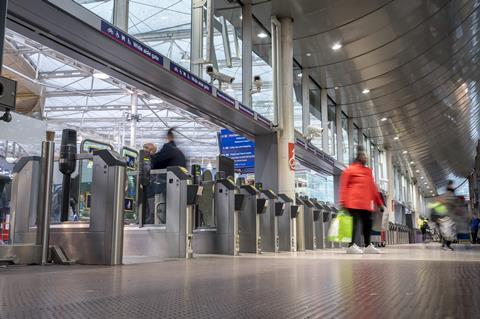
UK: The Department for Transport has announced details of the new flexible season tickets aimed at commuters travelling two or three days a week.
The smartcard or mobile phone based tickets will be offered by all DfT-franchised train operating companies across England, and are to go on sale from June 21 for use from June 28.
The flexi tickets will allow travel on any eight days in a 28-day period. Passengers will be expected to tap or scan in at stations and will not need to select the days of travel in advance.
Exact details of the savings for passengers are to be provided before tickets go on sale, but DfT said two day-a-week commuters buying multiple flexible season tickets could save more than £250 over the course of a year if travelling from Woking to London, more than £200 from York to Leeds, more than £60 from Southampton Central to Winchester or more than £220 from Liverpool to Manchester.
Passengers who travel four or more days a week would normally be better off continuing to use conventional season tickets, which will still be available, while those who travel less frequently may be better off buying daily tickets.
Post-pandemic travel
‘For many, the idea of travelling five days a week to the office is fast becoming a relic of the past’, said Secretary of State for Transport Grant Shapps. ‘The future is flexible: passengers want a simple, stress-free option, and new flexible tickets make fares fairer.’
Robert Nisbet, Director of Nations & Regions at the Rail Delivery Group, said ’the pandemic has recast how and where people work, which is why we’ve worked with government to introduce new season tickets’.
Reiterating its long-standing call for call for wider reform of the ticketing system, RDG said ‘Flexi season tickets are a step in the right direction, but to really maximise the benefits and make it easier for people to get good value fares requires government to go further and get under the bonnet to fix the engine of the fares system.’
Richard Burge, Chief Executive of the London Chamber of Commerce & Industry, said ‘it is important that flexible ticketing is flexible enough for the post-pandemic world of work’, and said the government should review the effectiveness of what is being offered as new ways of working become established.
‘Should flexible tickets prove to be too prescriptive, then those with the flexibility to decide how many days they commute each week may choose to work remotely more days than they would have, due to it not being cost effective enough to travel’, he said. ‘For example, if three days equals the same cost as five, then some people may choose to travel for two only. This would have implications for city centres.’
- The government has also indicated that it plans to explore options to eradicate ‘ironing-board’ seats, and reduce the number of ‘repetitious and annoying’ recorded announcements.



